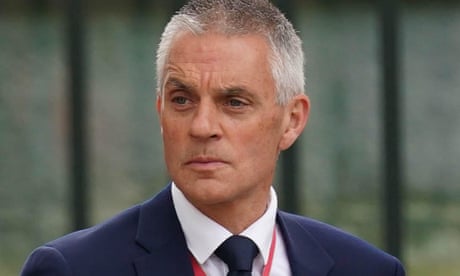
The BBC is to sign more deals with commercial partners in an effort to shore up its finances, with further cuts to services expected as it faces the potential end of the licence fee.
Tim Davie, the director general, will use a speech on Tuesday to pledge to “secure the future of the BBC” with a range of measures including more aggressively chasing profitable deals, such as the recent partnership with Disney to produce Doctor Who.
Davie will say it is necessary to “radically transform and renew” the BBC, another indication that further changes to the corporation’s output and job losses may be looming. Long-running expensive programmes could be for the chop, while there is a debate over whether the corporation can continue to support dozens of separate TV channels and radio stations at the same time as investing in digital output. Some of the BBC’s previous rounds of financial cuts have been going on for so long that they are likely to overlap with the next round of cuts.
He will acknowledge that the corporation is lagging behind global streaming rivals when it comes to its streaming apps, with the iPlayer homepage lacking the powerful personalisation and recommendation algorithms that power the likes of Netflix. As a result, he will pledge to rebuild all its online products to offer a more personalised service.
Davie will also warn about the effect on British society from losing shared cultural moments and allowing “US and Chinese algorithms” to shape what we consume and squeeze out British dramas: “We are in danger of allowing the UK’s world-class creative industries to be undermined, and diminishing our unique cultural identity and its remarkable influence worldwide.”
Income from the licence fee fell to £3.74bn last year as fewer households pay the fee. Although this will be mitigated by a price rise to £169.50 from April, the BBC argues that the last 14 years of funding cuts by Conservative-led governments have reduced its budget by 30% in real terms.
The BBC is already introducing adverts aimed at British listeners for some of its podcasts for the first time, while it is moving many of its radio producers out of its public service division and into its for-profit commercial arm. The corporation has struggled to retain high-profile podcast hosts, who are being lured away by commercial rivals.
The current licence fee agreement expires at the end of 2027 and the Conservative government has pledged to replace it with a new funding model. Even if Labour wins the next general election there are likely to be big changes to the way the BBC operates over the next few years.
Although the overwhelming majority of Britons use BBC services on a weekly basis, the average time they spend with the national broadcaster is falling – and the corporation is struggling to produce content that attracts the younger consumers who are core to its future.
In March the government appointed a nine-person advisory panel to look at alternatives to the licence fee, including a number of longstanding BBC critics. Those on the board include the former Sunday Times editor Martin Ivens, former ITV chair Sir Peter Bazalgette and Rishi Sunak’s former director of communications Amber de Botton.
The government has said their work will be completed this year and although there is little chance of any crucial decisions being made on the BBC’s future this side of the general election, the future of the national broadcaster is likely to become a live issue during the campaign itself.